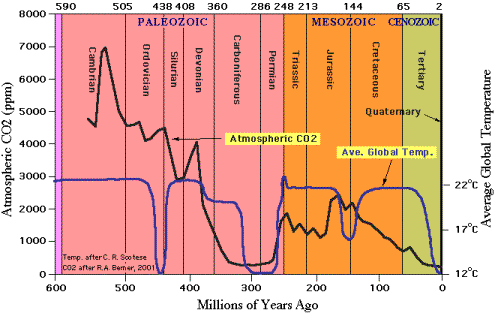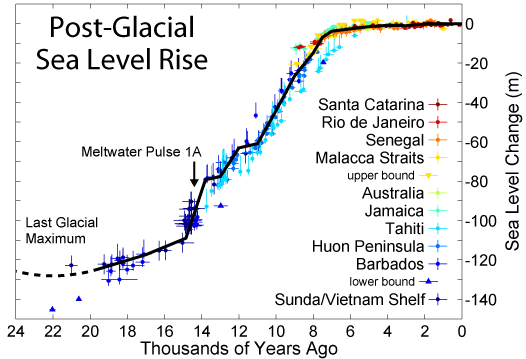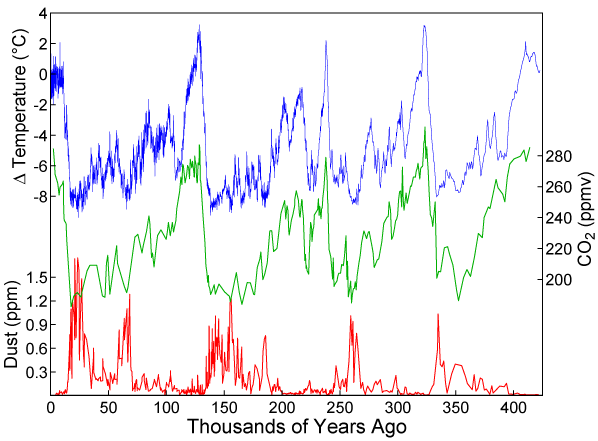We are constantly being told that corals are in danger of extinction from global warming and ocean acidification. It is difficult to overstate how ridiculous these claims are.
Corals evolved 500 million years ago when CO2 levels and temperatures were much higher.
Corals normally grow at depths less than 30 metres, which means that all modern coral reefs had to have formed during the last 8,000 years.
http://www.globalwarmingart.com/wiki/File:Post-Glacial_Sea_Level_png
Corals spawn very quickly. Bikini Island was vaporized in the 1950s by the world’s largest nuclear explosion. It now has some of the healthiest corals in the world. “An amazing sight is seeing the spawning of the coral, which happens in late spring/early summer and is often called an ‘underwater snowstorm‘”
Corals regularly survive temperature changes of 10C
The scientific record shows us that corals are very adaptable. When environmental conditions become unfavorable, they move. The principle of natural selection tells us that adaptable creatures survive, and people obsessed with “sustainability” get thrown out of office next week.
What threatens corals is real pollution. CO2 is just a mindless distraction.





“What threatens corals is real pollution. CO2 is just a mindless distraction.”
CO2 is a distraction, but it should also be pointed out that coral reefs thrive on CO2 through the photosynthetic members of their ecosystem.
Also, added CO2 pushes the bicarbonate/carbonate/calcium carbonate equilibrium towards precipitating more calcium carbonate, allowing coral reef pieces to concrete together, further stabilizing their structure.
As far as coral reefs, H+ ions released by this extended equilibrium can have no effect on itself.
The concept that marine organisms are pH sensitive comes from ignorance of marine biology. Photosynthetic processes raise seawater pH drastically, whole pH units, up to 9-10 in bays and estuaries. A 0.1-0.2 change in pH downward might be welcome compared to the daily increases they have to experience.
Thus far, the ocean pH has been well within normal ranges of change of pH – nothing unusual happening here.
Experiments with a variety of marine organisms have shown that they can tolerate low pH values well below any imagined CO2-caused pH in seawater.
The concept of acidification only works in distilled water. Seawater is a complex buffer which resists changes in pH. So, added CO2 will have little efect on ocean pH.
Well said, Charles Higley. Many species of corals are commensal with algae, who also alter the local pH and buffering capacity of water via photosynthesis and respiration cycles.
“when CO2 levels and temperatures were much higher.”
actually, when CO2 levels were concluded to be much higher by examination of proxy data which may or may not be accurate.
“What threatens corals is real pollution.”
Pollution, yes, fishing with dynamite, hand grenades, etc, trawling, and habitat destruction by all kinds of actors including typhoons/hurricanes, dredging, etc etc
“What threatens corals is real pollution. CO2 is just a mindless distraction.”
Steven, thank you for this statement. It cannot be said enough.
There are real problems with people making a hash out things and making an awful mess. CO2, in present concentrations is a harmless trace gas. OMG fishing with dynamite you’ve got to be kidding?
You think I am kidding ? Nope
http://articles.sfgate.com/2002-05-30/news/17545619_1_coral-reefs-lobster-giant-clams
Reefer madness more like it …
Reefer Madness (aka Tell Your Children) is a well known 1938 American exploitation film revolving around the tragic events that ensue when high school students are lured by pushers to try “marihuana”: a hit and run accident, manslaughter, suicide, attempted rape, and descent into madness all ensue. The film was directed by Louis Gasnier and starred a cast composed of mostly unknown bit actors. It was originally financed by a church group and made under the title Tell Your Children.[1][2]
http://en.wikipedia.org/wiki/Reefer_Madness
Sure coral has survived for long periods of time over different climates, in different parts of the world.
That’s different to wanting the current coral to survive where it is and sustain the current populations that depend on the fish that surround them.
Coral that dies out in one place, and is replaced by new coral, growing back slowly over 100’s of years, in other parts of the world, won’t sustain the current ecosystem. It would be a massive disruption.
Rubbish. It does not die out. Yes it can be blown up by dynamite, or poisoned by phosphate runoff, but it seems quite adaptable if left alone.
See these write upsof recent research carried out on the Great Barrier Reef.
“Corals evolved 500 million years ago when CO2 levels and temperatures were much higher.”
BUT;
“all modern coral reefs had to have formed during the last 8,000 years.”
AND;
Co2 is higher now than at any time in the last 8000 years.
THEREFORE;
Modern corals have never been exposed to the levels of Co2 they are now facing and scientific research shows that many will fair badly – unless you have evidence that the large body of published science on the subject can rationally be refuted and dismissed based solely on your first statement?
There are plenty of coral reefs which are thriving now, and they don’t care about the 390 ppm CO2 or your research.
“There are plenty of coral reefs which are thriving now, and they don’t care about the 390 ppm CO2 or your research.”
An unsupported assertion that goes against established science. No one is saying that ALL types of coral will be adversely affected by higher temps and lower pH, but many, particularly those that are used to conditions over the last 8000 years will be.
http://scholar.google.com/scholar?hl=en&client=firefox-a&hs=EEt&pwst=1&rls=org.mozilla:en-GB:official&q=coral+reef+climate+change&um=1&ie=UTF-8&sa=N&tab=ws
If the tropics expand, the range of corals will expand to higher latitudes.